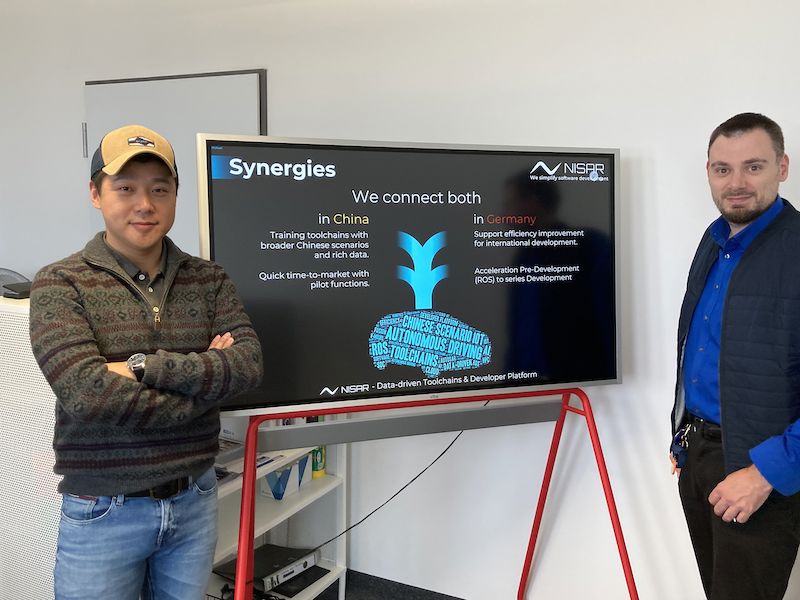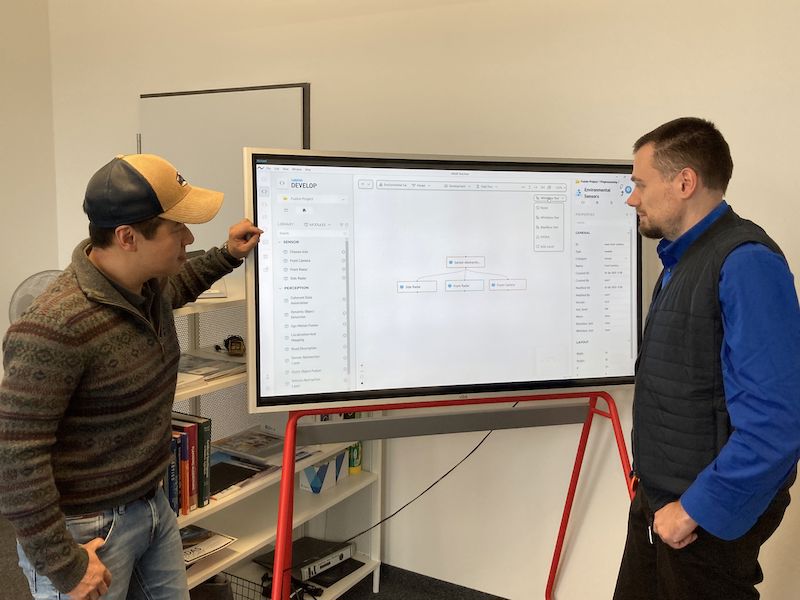Source: https://www.bayern-innovativ.de/de/seite/interview-mit-der-nisar-autonomy-gmbh
Translated with https://www.deepl.com
Nisar Autonomy GmbH develops a technical, data-driven platform to increase efficiency in the development of intelligent, (partially) autonomous software systems. With its extensive expertise, the start-up from Garching near Munich specializes in the fields of automotive, robotics, communication, cloud computing and functional safety. Nisar Autonomy GmbH has also recently become a partner in the Automotive Cluster.
Transformation pilot Dirk Maaß visited the company and gained interesting insights in the following conversation with the two managing directors Dr. Michael Göller and Dr. Ke Zhu.
Hello Michael, hello Ke, thank you very much for telling us more about your company today. Since you recently became a partner in the Automotive Cluster at Bayern Innovativ, we would like to get to know you and your business better and learn more about your business idea, products, competencies and needs. We are also interested in your attitude towards transformation. But first things first… first I would like to know where the name NISAR comes from and to what extent it stands for your company.
Michael Göller: Hello Dirk, we are also pleased to introduce ourselves as new cluster partners and to tell you more about our company. In fact, the name NISAR is based on our mascot. It is a narwhal – with its tusk, it symbolizes the ability to penetrate resistance. At the same time, the tusk is a very sensitive organ with very fine sensors – precisely the sensors we need in the world of autonomous intelligent systems. Our narwhal comes from the Isar River, hence the name NISAR.
What is your background and where are you from?
Ke Zhu: Our team is primarily made up of very experienced members who can already look back on longer professional experience. We cover a very broad field and complement each other very well: Michael and I both come from robotics and did our doctorates there. After that, we worked for several years in the automotive industry in the field of driver assistance systems and sensor fusion. Additionally, we have deep knowledge of IT, IoT and cloud technology. As of now, we are aligning our team on two pillars to simultaneously serve Germany and China – currently the most dynamic market.
What are your core competencies?
Michael Göller: Our greatest competence – apart from what has been learned individually over the years in research and development – is probably the broad field that we cover in our team. We combine the world of automotive and ADAS development with robotics as well as IoT and cloud expertise. What’s exciting is that we’ve found many times in the team that we have completely different perspectives on the same problems. This enables us to combine all these perspectives into one solution: a modern, cloud-based tool landscape for data-driven development.
What needs do you want to cover?
Ke Zhu: The need we see and have experienced in our own past is to significantly increase efficiency in automotive software development. This applies to both cost and development time. Electromobility has opened the door for countless new players in the market. However, only those who can develop quickly and cost-effectively will be able to hold their own in the market.
Michael Göller: We see two main levers here: IT and information technology, as well as automotive. I would like to explain this in more detail: In the IT and computer science world, the tools are strongly usability-oriented. For example, there are metrics that say after how many clicks the user must be able to reach his goal. In the automotive world, on the other hand, tools are often strongly process-oriented. Here, we have to design the tools in such a way that they are usability-oriented and correctly map the processes in the background. In an interview, we were once told that we have to bring automotive SW development to where IT is today – and not where it was 20 years ago.
Ke Zhu: In addition, tool chains in the automotive world have grown over a long time and often consist of separate tools created for individual problems. There are countless breaks in the chains here. What is missing is a platform from a single mold that unites all of these parts and uses state-of-the-art technology from IT or information technology.

That sounds very challenging…What do you want to focus on?
Michael Göller: We will not reinvent every wheel. We are focusing on a modern, cloud-based platform specifically for the data-driven development of mobile, intelligent systems, i.e. for automated driving and robotics. To this end, we are developing tools for modular architecture design, re-simulation and over-the-air vehicle integration, as well as a browser specifically for ROS that can be used to debug nodes and topics live at runtime. And we then also dock the established tools onto this cloud platform.
Where do you see your potential and which market is interesting for you?
Michael Göller: Indeed, there is a spirit of optimism in the field of autonomous driving. In line with the motto “In a gold rush, don’t invest in digging, invest in shovels”, we identify development tools for automotive software in general and driving functions in particular as our markets. With our roots in ADAS, robotics and IT, we want to create this platform that will allow developers to really focus on their core task and our customers to experience significant efficiency gains as a result. In the long term, we want to expand this platform into a complete ecosystem in which we bring the developer community together and also make the exchange between individual players much more efficient.
Ke Zhu: We are looking in particular at the Chinese market, because with our native team there we understand the market, the critical scenarios and interests, and the local mentality. This enables us to enter into partnerships locally and also to be a springboard for German companies into the Chinese market.
What do you understand by transformation?
Michael Göller: Transformation is a natural process of dynamic adaptation – transformation is progress. Established, evolved approaches and technologies are replaced by those that emerge from the current state of the art. This applies to drive systems just as much as to development tools. Software is increasingly taking over the unique selling points: In the past, you sold a car with some software; in the future, you may sell software with a car.
What or who are you looking for (e.g., professionals, development partners, etc.)?
Ke Zhu: We are specifically looking for interested parties who see these challenges in the same way as we do and who want to go down this path with us. These can be enthusiastic people who want to work out solutions with us, or people or companies who see problems for which they themselves do not yet have a solution. But everyone who is interested in the subject matter is also welcome – especially in times of change, the best way to develop is through mutual inspiration.
Michael Göller: We are currently interested in technical discussions with developers and software architects in order to learn “where the shoe pinches”. We are also interested in companies that would like to try out our tools and provide us with feedback for further development.

Thank you very much for the interesting exchange with you. It is always exciting to get a closer look at innovative companies and especially our cluster partners. I am sure that your ideas and competencies will take you a long way and I am happy to be able to support and accompany you. I wish you continued success with your projects.

